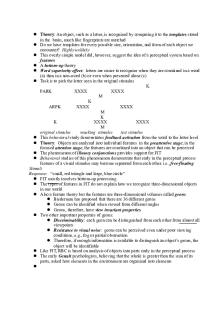Domains OF Cognitive Psychology PDF

| Title | Domains OF Cognitive Psychology |
|---|---|
| Course | Applied Cognitive Psychology – II |
| Institution | Aligarh Muslim University |
| Pages | 4 |
| File Size | 69.1 KB |
| File Type | |
| Total Downloads | 22 |
| Total Views | 130 |
Summary
From twelve major fields of research, modern cognitive psychology freely draws theories and approaches . The following is a quick description of each area:
Cognitive Neuroscience: Cognitive psychologists and cognitive neuroscientists have just recently created a tight working partnershi...
Description
DOMAINS OF COGNITIVE PSYCHOLOGY From twelve major fields of research, modern cognitive psychology freely draws theories and approaches . The following is a quick description of each area: Cognitive Neuroscience: Cognitive psychologists and cognitive neuroscientists have just recently created a tight working partnership. So far, this collaboration has resulted in some of the most intriguing advances in the field of mental character research. Cognitive psychologists are looking for neurological explanations for their findings, while neuroscientists are looking to cognitive psychologists to explain their discoveries. Basic electrochemical processes in the brain and nervous system support every aspect of the cognitive process, from sensation to memory. Perception is a discipline of psychology that deals specifically with the detection and interpretation of sensory stimuli. We have a solid grasp of the sensitivity of the human organism to sensory signals, and more importantly, the way we interpret sensory signals, thanks to perception tests. Many of the components of this process have been identified thanks to the experimental research of perception. Perception alone, however, does not properly account for expected performance; other cognitive systems, including as pattern recognition, attention, consciousness, and memory, are also involved. iii) Pattern Recognition: Environmental stimuli are rarely seen as isolated sensory events; instead, they are frequently seen as part of a larger pattern. Almost all of the things we see, hear, feel, taste, or smell are part of a complex pattern of sensory inputs. Consider the issue of reading. Reading is a difficult task in which the reader must create a meaningful pattern from a seemingly random collection of lines and curves. The reader can retrieve meaning from his or her memories by organising the inputs that make up letters and words. The entire process takes a fraction of a second, and considering all of the neuroanatomical and cognitive systems involved, this achievement – which is executed on a daily basis by people of all kinds – is incredible.
Attention: Although humans are information-gathering beings, it is clear that we are highly selective in the amount and type of information we pay attention to in typical conditions. Our ability to interpret data appears to be restricted to two levels: sensory and cognitive. We can become overloaded if we are exposed to too many sensory indications at once; if we try to process too many events in memory, we can become overloaded, which can lead to a performance breakdown. At some point in our lives, we've all felt the same way.
"The current awareness, of external or internal events," is how consciousness is defined. Despite being dismissed by behaviourists as "unscientific," the term "consciousness" and the concept it conveys did not fade away. Conscious and unconscious ideas (such as those experienced on a first date) are very real for most people. When you look at your watch while studying and it reads "10:42 (P.M.)," for example, you are conscious of that external signal. However, checking the time triggers another conscious thought, one that was triggered by reading the time but comes from "on the inside." "It's becoming late: I'd better finish this chapter and go to bed," that conscious thinking might be. Consciousness has recently earned fresh acceptability, and it is currently a topic of serious study in modern cognitive psychology.
Memory and perception are intertwined in the human brain. Our perception, short-term memory, and long-term memory all contribute to the information we have. The most obvious long-term storage is linguistic knowledge. We take terms from LTM and use them correctly in most cases. We may recall facts about an incident that occurred years ago in a fraction of a second. Such knowledge is not derived from a direct perceptual experience; rather, it is stored in the LTM among a large number of other facts. The representation of knowledge, or how information is symbolised and integrated with the objects stored in the brain, is at the heart of all human
cognition. The conceptual representation of knowledge in the mind and the way the brain retains and processes information are both components of cognition. Individuals' conceptual representations can differ significantly. Despite these fundamental differences between knowledge representations, most persons experience and express experience in sufficiently comparable ways to get along in the world. The information's content is likewise vastly different. Our neurological web, on the other hand, entraps information and experiences in structures that are comparable in all human brains.
Internal representations of knowledge are a topic of particular interest to cognitive psychologists. The mental representations of the environment are created using a cognitive map, which is a type of internal representation of the juxtaposed buildings, streets, street signs, spotlights, and so on. Significant clues can be extracted from the cognitive maps. Although the experimental study of mental imagery is still relatively young in psychology, there has lately been some noteworthy studies published. Language is a sort of knowledge that is shared by all human communities. The study of how language is utilised is a fundamental focus of cognitive psychology since language is the primary way through which humans learn and express knowledge. Language development is a special type of abstraction that is essential to cognition. Language processing is a crucial part of the information processing and storage process. Perception, a fundamental part of cognition, is also influenced by language. Developmental Psychology: Another key topic of cognitive psychology that has received a lot of attention is developmental psychology. We now have a much better knowledge of how cognitive structures develop thanks to recent studies and theories in developmental cognitive psychology. We've all gone through childhood and adolescence as adults, and we've all shared maturational experiences with other members of our species. Thinking and Concept Formation: The crown jewel of cognition is thinking. Thinking is the process of transforming information into a new mental
image. Cognitive psychology has given rise to a powerful array of research methods and theoretical concepts. Cognition is defined as the ability to think and form concepts. Similar concepts aid in the comprehension and processing of data. The laws and processes of concept formation have a substantial body of knowledge.
Human and Artificial Intelligence: Human intelligence is defined as the ability to acquire, recall, and apply knowledge in order to comprehend concrete and abstract concepts, as well as the relationships between objects and ideas, to comprehend a language, to follow instructions, to convert verbal descriptions into actions, to behave according to rules, and to apply knowledge in a meaningful way. Artificial intelligence, a branch of computer science, has had a significant impact on cognitive science, particularly because programme design necessitates understanding of how we process information. The goal of cognitive psychology is to see if a flawless robot can mimic human behaviour....
Similar Free PDFs

Domains OF Cognitive Psychology
- 4 Pages

COGNITIVE PSYCHOLOGY
- 591 Pages

Domains of Practice CYC
- 3 Pages

SP605 Cognitive Psychology
- 70 Pages

Cognitive Psychology Paper 3
- 5 Pages

Cognitive psychology notes
- 26 Pages

Cognitive psychology 3
- 3 Pages

Cognitive Psychology Unit-1
- 14 Pages

Cognitive Psychology Class 2
- 8 Pages

Cognitive Psychology Notes
- 34 Pages

Psych 414 Cognitive Psychology
- 9 Pages

SELECTED TOPICS IN COGNITIVE PSYCHOLOGY
- 125 Pages
Popular Institutions
- Tinajero National High School - Annex
- Politeknik Caltex Riau
- Yokohama City University
- SGT University
- University of Al-Qadisiyah
- Divine Word College of Vigan
- Techniek College Rotterdam
- Universidade de Santiago
- Universiti Teknologi MARA Cawangan Johor Kampus Pasir Gudang
- Poltekkes Kemenkes Yogyakarta
- Baguio City National High School
- Colegio san marcos
- preparatoria uno
- Centro de Bachillerato Tecnológico Industrial y de Servicios No. 107
- Dalian Maritime University
- Quang Trung Secondary School
- Colegio Tecnológico en Informática
- Corporación Regional de Educación Superior
- Grupo CEDVA
- Dar Al Uloom University
- Centro de Estudios Preuniversitarios de la Universidad Nacional de Ingeniería
- 上智大学
- Aakash International School, Nuna Majara
- San Felipe Neri Catholic School
- Kang Chiao International School - New Taipei City
- Misamis Occidental National High School
- Institución Educativa Escuela Normal Juan Ladrilleros
- Kolehiyo ng Pantukan
- Batanes State College
- Instituto Continental
- Sekolah Menengah Kejuruan Kesehatan Kaltara (Tarakan)
- Colegio de La Inmaculada Concepcion - Cebu



